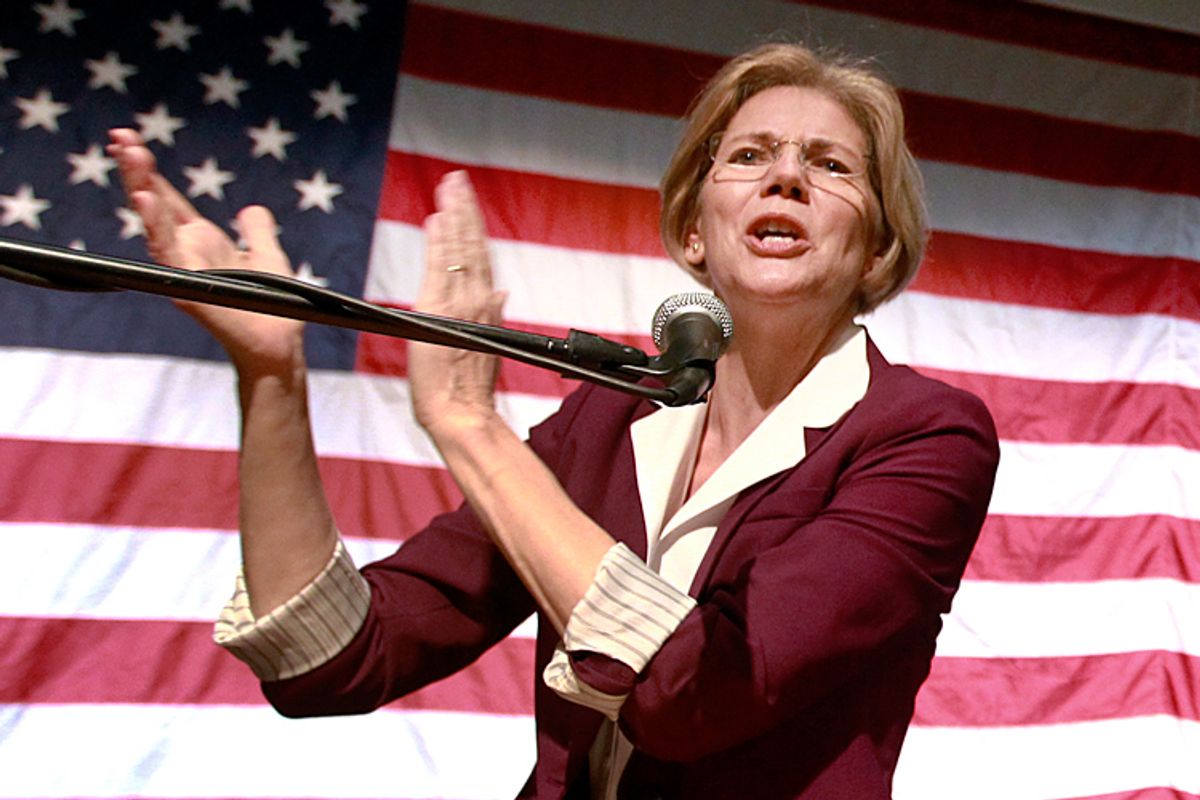Despite its success in recent elections, and despite the image of unity it projects, the Democratic Party is in the throes of an epic identity crisis pitting its corporate money against its stated principles. The recent actions of two of the party's rising stars -- Colorado Gov. John Hickenlooper and Massachusetts Sen. Elizabeth Warren -- tell the deeper tale of that crisis. It is a microcosmic story, suggesting that the 2016 election may be a decisive turning point in the party's history.
The money side of the schism is embodied by Hickenlooper. As the new vice-chairman of the Democratic Governors Association, the former petroleum geologist and beer mogul represents a cabal of Democratic politicians whose brand couples moderate positions on social issues with hard-edged corporatism on economic ones.
Corporatism, of course, is a vague label, but in Democratic politics it typically refers to helping campaign contributors bust unions and dismantle environmental regulations, with the expectation that servile labor and environmental leaders will sit by as their movements are decimated.
Hickenlooper’s actions this month show how the formula works.
On labor issues, after a summer of staging media events to thank firefighters for combating wildfires, the Colorado governor publicly threatened to veto legislation that would enshrine the right of those firefighters to choose to form a union. Of such basic legal protections, Hickenlooper flippantly declared that he does "not believe it is a matter of state interest."
On environmental issues, it is the same story. Hickenlooper this week testified against federal legislation that would compel energy companies to disclose what toxic chemicals they use when fracking for natural gas. His testimony made headlines after he insinuated that fracking fluid is so harmless that Americans can safely drink it.
While Hickenlooper's claim was later debunked, few observers were surprised he would utter such a pernicious lie. After all, with Hickenlooper's electoral career bankrolled by fossil fuel firms, he has not just ignored the scientific evidence that shows fracking is dangerous; he has also denied that climate change is happening, offered to back corporate lawsuits to overturn municipal drilling regulations and appeared as a spokesman for the oil and gas industry in its political advertisements. Additionally, the Denver Post reports that Hickenlooper's regulators "rarely penalize companies responsible for (drilling-related) spills."
If you find this repulsive, then you are probably on the other side of the Democratic Party divide, the one personified by Warren.
Though a freshman legislator, she is already a celebrity thanks to her longtime advocacy on behalf of the poor, her fiery tenure running the panel that audited the 2008 bank bailout and her 2012 election victory over a Wall Street-financed opponent. This week, as if deliberately underscoring her commitment to live up to the Democratic Party's populist billing, Warren rejected the unspoken Washington rule requiring junior lawmakers to keep quiet. Instead, she used her first committee hearing to slam Obama administration regulators for being weak on financial crime.
In assuming such a posture, Warren, along with Sens. Sherrod Brown, D-Ohio, and Al Franken, D-Minn., represents what the late liberal Sen. Paul Wellstone called "the democratic wing of the Democratic Party." In other words, unlike Hickenlooper's cadre, she doesn't represent the business elites who buy politicians like shares of stock. She represents the millions of voters who win the party elections.
For his part, Hickenlooper has deployed cronies to stoke rumors of a presidential candidacy. Meanwhile, the ABC News headline "Elizabeth Warren 2016?" summarized the sentiment of liberals who are buzzing about a possible Warren White House bid.
Regardless of whether the two run, it is likely that the 2016 Democratic presidential primary will feature their archetypes, forcing the party's coalition to choose a side. It is also a good bet that because those archetypes are at odds with one another, whichever side wins will decide the party's direction for generations.



Shares